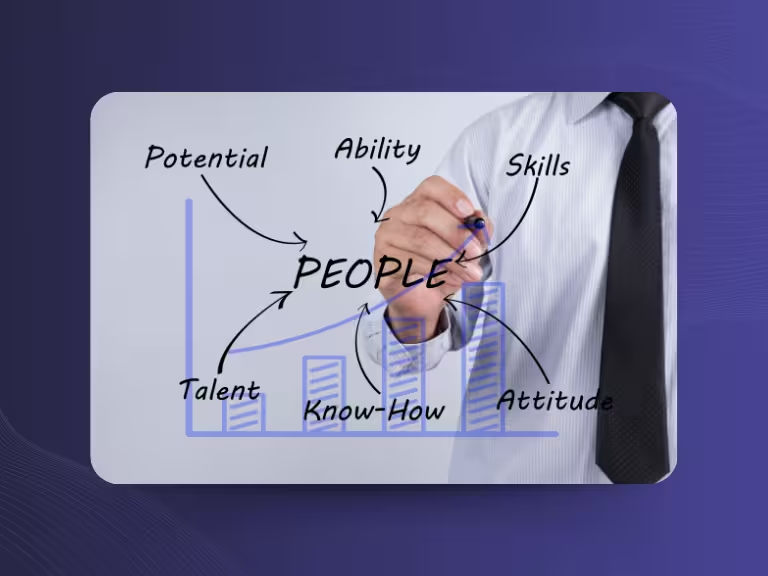Table of Contents
Why is Talent Management Critical for Business Success?
In a world where the battle for the best minds is becoming increasingly intense, talent management determines the success or failure of a company. While in the past, mainly large corporations systematically invested in their employees, today small and medium-sized enterprises are also challenged to strategically develop and retain their talent.
The challenges are diverse: How do you find the right talent? How do you develop them further? And above all: How do you ensure that your best employees stay with the company long-term? These questions concern leaders and HR professionals alike.
In this article, you'll learn what modern talent management entails, which processes are central to it, and how you can use technology and proven strategies to position your company for the future.
What is Talent Management? – Definition and Core Concepts
Definition of Talent Management
Talent management is far more than traditional human resources management. It encompasses all strategic activities aimed at identifying, attracting, developing, and retaining the right talent long-term.
The crucial difference from traditional human resources management lies in the strategic alignment. While classic HR often acts reactively, talent management thinks proactively and long-term. It directly connects business objectives with employee development.
Importance for Companies
Effective talent management directly impacts company culture. Employees who feel valued and supported are more productive, innovative, and stay loyal to the company. According to a 2023 Deloitte study, 80 percent of executives state that digital transformation cannot be successful without a "talent-first" strategy.
The connection between talent management and business success is measurable: Companies with structured talent programs show higher employee satisfaction, lower turnover, and ultimately better business results.
The Core Processes in Talent Management
Recruitment and Onboarding
Talent acquisition has fundamentally changed. Modern companies rely on AI-supported candidate pre-screening, which helps identify the most promising candidates from hundreds of applications. Digital assessments enable objective evaluation of skills even before the first personal interview takes place.
A structured onboarding process is particularly important. The first weeks often determine whether a new employee will stay with the company long-term. Here, tools like Sally can help document important introduction meetings and ensure that no important information is lost.
Authentic employer branding plays a central role. Talent wants to know what a company stands for and how the work culture is actually lived. Honest communication about challenges and opportunities builds trust and attracts the right candidates.
Employee Development and Career Planning
Personalized training programs are the heart of modern employee development. Every employee has individual strengths and development areas. Coaching and mentoring programs help foster these in a targeted manner.
Career paths must be transparent and achievable. Particularly for key positions, thoughtful succession planning is essential. This involves not only professional qualifications but also leadership competencies and cultural fit.
Agile learning and digital learning platforms enable employees to continue their education flexibly and as needed. The days of rigid training programs are over. Today, employees learn when they need it and at the pace that suits them.
Employee Retention and Engagement
Work-life balance is no longer a nice-to-have but a decisive factor for employee satisfaction. Flexible working hours, home office opportunities, and an open feedback culture are now standard.
People analytics helps identify turnover risks early. By analyzing employee data, companies can act proactively before valuable talent leaves the company. Regular employee meetings, structured and documented with tools like Sally, create the foundation for these analyses.
Incentives and benefits must match employee needs. While a higher salary is decisive for some, others value additional vacation days or professional development opportunities more.

Successful Strategies and Best Practices in Talent Management
Individual Development Plans and Regular Feedback
Transparency and communication are the cornerstones of successful talent development. Every employee should have an individual development plan created together with their supervisor and regularly reviewed.
Feedback shouldn't only happen once a year during the employee review. Continuous feedback helps improve performance and maintain motivation. Promoting leadership competencies and resilience prepares employees for future challenges.
Promoting Diversity and Inclusion
Diversity is a real competitive advantage. McKinsey & Company shows in a 2023 study that teams with different perspectives achieve better performance and shorten innovation cycles. Talent management must actively remove barriers and promote inclusive career models.
This means concretely: creating diversity-friendly job postings, training leaders in cultural sensitivity, and making advancement opportunities equally accessible to all employee groups.
Practical Examples and Case Studies
Companies like Google or Unilever show how data-driven and diversity-oriented talent management works. Google, for example, uses complex algorithms to identify employees with high potential and support them in a targeted manner. Unilever has completely digitized its recruiting processes and was able to significantly increase the diversity of its workforce.
These examples show: Successful talent strategies combine human intuition with data-driven insights. They are designed for the long term and are continuously adapted.
Digitalization and Technology in Talent Management
Digital Tools and AI in Recruiting and Onboarding
Automated candidate selection has revolutionized recruiting. AI systems can analyze hundreds of resumes in seconds and suggest the best candidates. Chatbots handle initial contact and answer standard questions around the clock.
Online assessments and virtual interviews have gained particular importance since the pandemic. They enable geographically independent evaluation of talent and save time and costs.
People Analytics and Performance Management
Real-time analytics on employee development are becoming increasingly important. Companies today measure KPIs like employee satisfaction, promotion rates, and the return on investment of training measures.
This data helps optimize talent strategies and target investments strategically. It's important that data collection is transparent and GDPR-compliant.
Digital Learning Platforms and Individual Professional Development
Flexible, hybrid learning is now standard. Employees can choose between online courses, in-person events, and learning-on-the-job. Promoting lifelong learning becomes a survival strategy in a rapidly changing work environment.
Modern learning platforms automatically adapt to users' learning styles and pace. They make learning an individual, motivating experience.

Global and Future-Oriented Talent Management
Cultural Differences and Global Challenges
Internationally operating companies must adapt their talent strategies to regional characteristics. What works in Germany may not necessarily be successful in Asia or America.
Multicultural leadership and the integration of employees from different cultures require sensitivity and adaptability. Successful global talent programs consider local labor markets and cultural expectations.
Metrics for Success Measurement in Talent Management
Without measurable indicators, it's difficult to assess the success of talent strategies. Important KPIs are turnover rate, time to productivity for new employees, internal promotion rate, and employee satisfaction.
These metrics enable systematic management and optimization of talent management. Regular reviews of these indicators help identify trends early and take countermeasures.
Conclusion: Talent Management as a Strategic Success Factor
Successful talent management is a holistic approach that seamlessly connects recruitment, development, and retention. The use of modern technologies and data-based analyses makes talent strategies measurable and manageable.
Actively promoting diversity and an inclusive corporate culture is not only ethically right but also economically sensible. Diverse teams are more innovative and productive.
Particularly important is adaptation to global markets and continuous success measurement. Talent management is not a one-time project but a continuous process that must adapt to changing conditions.
If you're ready to rethink and optimize your talent strategies, start with an honest assessment of your current situation. Tools like Sally can help you document important conversations and automate processes, giving you more time for what matters most: developing your most valuable resource – your employees.



Try meeting transcription now!
Experience how effortless meeting notes can be – try Sally free for 4 weeks. No credit card required.
Test NowOr: Arrange a Demo Appointment



